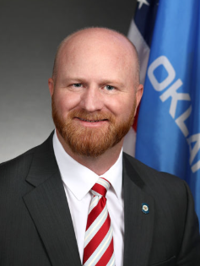
Brent Howard
OKLAHOMA CITY - Oklahoma lawmakers are poised to finally pass a law that brings back what was struck more than five years ago by the state Supreme Court - a cap on certain damages in lawsuits that helps businesses avoid blockbuster verdicts.
Parts of a tort-reform package have been included in a budget deal between leaders in both chambers of the Oklahoma Legislature and Gov. Kevin Stitt, and chief among them is a $500,000 cap on non-economic damages that companies can feel confident would withstand a legal challenge, considering six of the state Supreme Court's justices were appointed by Republican governors.
That wasn't the case in 2019, though, when that court invalidated a $350,000 cap in a controversial opinion.
"I think it'll be huge for our business community to have some sort of certainty that the cap provides when evaluating risk," said Adam Maxey, vice president of government affairs for the Oklahoma State Chamber.
The 2019 ruling held the $350,000 cap was a "special law" that created preferences and established inequality. For example, it said wrongful death plaintiffs received more than others who suffered a bodily injury.
Dissenting justice James Edmondson, who is still on the court, wrote "a legislative cap on damages... is included within the historically recognized role of a legislature in defining, creating, or abolishing a legal cause of action." Some states have caps on all civil cases, while some others restrict them to medical-malpractice lawsuits.
Sen. Brent Howard, the bill's sponsor, told Legal Newsline about SB453 that the "conference committee report is already signed out of the Senate and is just awaiting a few signatures in the House." The bill also aligns Oklahoma's standard for expert testimony with what is used in federal courts.
Under the bill, Oklahoma's cap would go up to $1 million for permanent mental injuries and won't apply to permanent and severe injuries, like amputations. Exceptions to the cap would occur in instances of fraud, gross negligence, reckless disregard and malicious intent.
Its approval is a long time coming for Sen. Julie Daniels, who had sought to bring back the cap in the legislative session immediately following the 2019 ruling.
She said when introducing this year's version that it will "ensure that runaway juries cannot impose unreasonable judgments against people who are economic drivers in Oklahoma."
Maxey noted there was plenty of opposition to the tort-reform package. Sen. Carri Hicks brought up the case of a 6-year-old girl who was mauled by a Rottweiler and will have major scarring across her face, according to the Oklahoma Voice.
She said the cap would make it difficult to find an attorney to her case because most of her damages fall in the non-economic category.
"It's one of those issues people try to paint as radical, but we know 30-some odd states have one of these and we did before the Supreme Court made a pretty bizarre decision," Maxey said.
The expert-testimony measure would require judges to use the Daubert standard when evaluating if an expert should be allowed to present before a jury. Most states use it or a modified version of it.
Whether an expert is deemed to have appropriately reached his or her conclusion can either sink or save a case and is a major issue in mass torts. With the disqualification of an expert, a judge handling consolidated litigation can effectively doom tens of thousands of cases, like a Florida federal judge did in proceedings over Zantac.
Those cases were brought after an independent lab heated Zantac in an artificial stomach to 266 degrees and introduced an amount of salt that would kill a human to produce the carcinogen NDMA. Though the Florida judge and the FDA rejected that basis, judges in Delaware and California let cases move forward.
"We just want to make sure junk science stays out of our courtrooms," Maxey said.
Already passed is a measure that requires disclosure of outside funding for lawsuits, an arrangement critics say leads to investors having control of if or when to settle, rather than the litigant and their attorneys.
Third-party litigation funders front money in exchange for a percentage of recovery that would normally constitute usury, but since they get nothing if the client gets nothing, judges have decided they aren't traditional "loans."
But in a few jurisdictions judges have decided defendants, who must disclose available insurance, should be able to know who is paying for the plaintiff's case. Oklahoma is now one of them, and plaintiffs also must admit when a foreign state or one of its instrumentalities is funding their case.
"(TPLF) fractures attorney-client privilege, reduces a lot of incentive for folks to settle or to use the system as intended to be made whole," Maxey said.
"Our courts aren't casinos. It's not a place where you go to make 35% on your investment. You go there as a plaintiff and your attorney."








